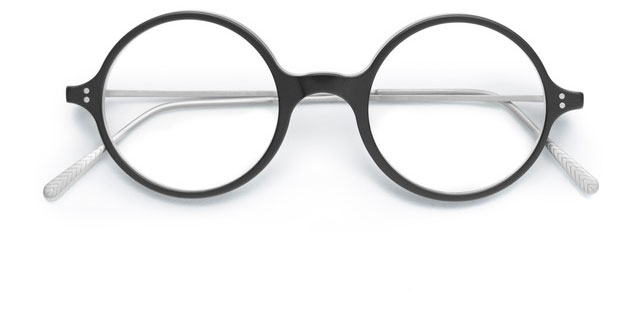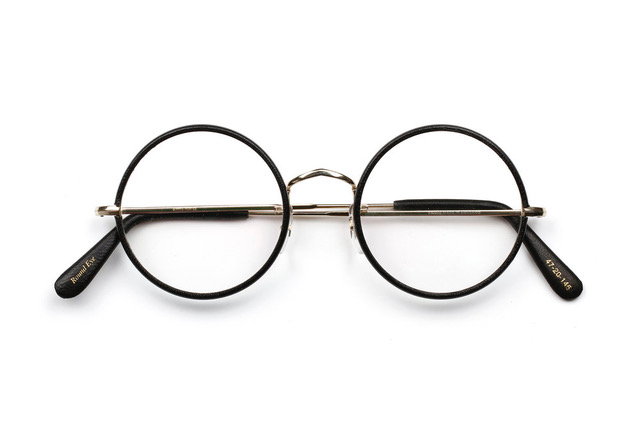A Movie Hitman’s Iconic Sunglasses
Glasses are a standard device in film. They help the viewer to identify specific characters, and can be artfully used to imbue a glance with meaning, or to completely obscure it. Few gestures are as meaningful as the slow removal of a pair of shades to reveal the ‘true face’ behind the mask.

The round sunglasses worn by Jean Reno in Luc Besson’s film Léon: The Professional – just like Audrey Hepburn’s oversized black sunglasses in Breakfast at Tiffany’s, Tom Cruise’s Wayfarers in Risky Business, and Johnny Depp’s yellow-lensed Aviators in Fear and Loathing in Las Vegas – have become true eyewear icons. Jean Reno portrays hitman Léon with a combination of childlike naiveté and brutal coolness. And his dark-lensed round glasses are an essential part of this performance.
Léon: The Professional’s costumer, Magali Guidasci, made sure that the outfits that the actors wore for their roles helped them to understand the characters they were playing – so that the outer and inner elements merged harmoniously.
The idea for the sunglasses that Léon continuously wears – particularly at night, because ironically, they help him see in the dark – stems from director Luc Besson. Guidasci has described Besson as her favorite film director, one who is deeply invested in the design elements of his films – a true professional, so to say.


To prepare for her work on a new film, Guidasci intensely studies the script to get to know and understand the characters. Next, she sits together with the director to discuss potential costumes. For the character of Léon, his relationship with the character Mathilda and her visual portrayal throughout the film was particularly interesting. Played by young Natalie Portman, Mathilda violently loses her family, and finds refuge with Léon. He swears to avenge her family’s murder and hides her, and a ambivalent relationship develops between the pair. When Mathilda learns of Léon’s job as a contract killer, she offers him a deal: she’ll teach him to read and write, and in return, he will train her to become a killer. At first, Léon is reticent, but eventually agrees. That Mathilda also later sports a pair of small, round, and even darker sunglasses than Léon’s – speaks volumes. The glasses function as a stylistic means of character development.
For Guidasci, it’s important to identify a basic color palette for each character’s costuming that will run throughout the entire film. When actors are cast, she develops an appropriate look based on their specific appearance. Face shape, skin tone, and hair color play a key role. The individual figures are not defined solely by their predetermined color palette, but also – depending on the situation – costumes are adjusted to play with the focus of the viewer. If an actor is in the foreground of a scene, the costume can make them stand out, or blend into the setting they’ve been placed in.
Besson, the film’s director, expressed a great faith in the costume designer who chose the iconic glasses for his title character, Léon. The first fitting is always conducted alone, with just the actor. Afterwards, he simply views the photos given to him by the costume designer. During the decision process, there’s no long consideration of particular looks. Besson works very intuitively, and, according to Guidasci, somehow ends up choosing the version that she also prefers the best.
The sunglasses worn by the killer with the strict “no women, no children” code of conduct came from the Junior Gautier line, and took on absolute cult status after appearing in the film. They are round with dark lenses, which hide Léon’s eyes completely from view. The frame is made from transparent acetate, and features golden temples that stand out, glimmering through the see-through material.
Léon: The Professional shows how closely bound a character can be to a particular style. The glasses serve as a wonderful style element; they also manage to create an unmistakeable look. One-of-a-kind vintage frames are particularly good at this, because they’re no longer available in large quantities for just anyone to purchase.
We’ll only say this much: you don’t have to become synonymous with your potted plant to have a distinctive character – a memorable pair of glasses will do the job just as well.
Glasses are a standard device in film. They help the viewer to identify specific characters, and can be artfully used to imbue a glance with meaning, or to completely obscure it. Few gestures are as meaningful as the slow removal of a pair of shades to reveal the ‘true face’ behind the mask.
The round sunglasses worn by Jean Reno in Luc Besson’s film Léon: The Professional – just like Audrey Hepburn’s oversized black sunglasses in Breakfast at Tiffany’s, Tom Cruise’s Wayfarers in Risky Business, and Johnny Depp’s yellow-lensed Aviators in Fear and Loathing in Las Vegas – have become true eyewear icons. Jean Reno portrays hitman Léon with a combination of childlike naiveté and brutal coolness. And his dark-lensed round glasses are an essential part of this performance.
Léon: The Professional’s costumer, Magali Guidasci, made sure that the outfits that the actors wore for their roles helped them to understand the characters they were playing – so that the outer and inner elements merged harmoniously.

The idea for the sunglasses that Léon continuously wears – particularly at night, because ironically, they help him see in the dark – stems from director Luc Besson. Guidasci has described Besson as her favorite film director, one who is deeply invested in the design elements of his films – a true professional, so to say.
To prepare for her work on a new film, Guidasci intensely studies the script to get to know and understand the characters. Next, she sits together with the director to discuss potential costumes. For the character of Léon, his relationship with the character Mathilda and her visual portrayal throughout the film was particularly interesting. Played by young Natalie Portman, Mathilda violently loses her family, and finds refuge with Léon. He swears to avenge her family’s murder and hides her, and a ambivalent relationship develops between the pair. When Mathilda learns of Léon’s job as a contract killer, she offers him a deal: she’ll teach him to read and write, and in return, he will train her to become a killer. At first, Léon is reticent, but eventually agrees. That Mathilda also later sports a pair of small, round, and even darker sunglasses than Léon’s – speaks volumes. The glasses function as a stylistic means of character development.

For Guidasci, it’s important to identify a basic color palette for each character’s costuming that will run throughout the entire film. When actors are cast, she develops an appropriate look based on their specific appearance. Face shape, skin tone, and hair color play a key role. The individual figures are not defined solely by their predetermined color palette, but also – depending on the situation – costumes are adjusted to play with the focus of the viewer. If an actor is in the foreground of a scene, the costume can make them stand out, or blend into the setting they’ve been placed in.
Besson, the film’s director, expressed a great faith in the costume designer who chose the iconic glasses for his title character, Léon. The first fitting is always conducted alone, with just the actor. Afterwards, he simply views the photos given to him by the costume designer. During the decision process, there’s no long consideration of particular looks. Besson works very intuitively, and, according to Guidasci, somehow ends up choosing the version that she also prefers the best.
The sunglasses worn by the killer with the strict “no women, no children” code of conduct came from the Junior Gautier line, and took on absolute cult status after appearing in the film.
They are round with dark lenses, which hide Léon’s eyes completely from view. The frame is made from transparent acetate, and features golden temples that stand out, glimmering through the see-through material.
Léon: The Professional shows how closely bound a character can be to a particular style. The glasses serve as a wonderful style element; they also manage to create an unmistakeable look. One-of-a-kind vintage frames are particularly good at this, because they’re no longer available in large quantities for just anyone to purchase.
We’ll only say this much: you don’t have to become synonymous with your potted plant to have a distinctive character – a memorable pair of glasses will do the job just as well.

